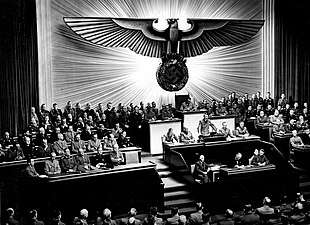Anti-American sentiment in Germany
Anti-American sentiment in Germany is the dislike of the American government or people[1] present in Germany. Anti-Americanism has been present in Germany throughout history with several notable incidents. Anti-Americanism became government policy during the Cold War in East Germany, with dissenters being punished. In West Germany, this sentiment was generally limited to left wing politicians.[2] With the election of eurosceptic president Donald Trump, some people observe that Anti-Americanism may be growing in Germany.[3]

History
World War II

The two nations were officially at war during World War II, following the German declaration of war against the United States.
Cold War
During the Cold War, Germany was split into two parts, East Germany and West Germany. Due to its Communist influence, Anti-Americanism was rampant in East Germany, being official government policy.[2] Anti-Americanism was strong among left wingers. Right wingers saw the United States as a protector against communism, but some still saw the American way of life as uncultured.[4]
Iraq War
German Chancellor Gerhard Schröder stated that Germany would refuse to provide troops or money for the Invasion of Iraq.[5] Some people interpreted Germany's stance on the Iraq War as a form of Anti-Americanism.[6]
Donald Trump
.jpg)
With the Election of Donald Trump, there have been renewed fears about the rise of Anti-American sentiment in Germany.[7] Donald Trump has been noted for his euroskepticism,[8] while Germany is one of the most Pro-EU countries in the world. In 2017, German magazine Stern published a cover depicting Donald Trump performing the Nazi salute, with the inscription Sein Kampf, obviously referencing Mein Kampf.[9] Germans have generally been more negative about their relations with the United States than most other European countries.[10]
See also
- Germany–United States relations
- Anti-American Sentiment
- Cold War
References
- Chiozza, Giacomo (2009). Anti-Americanism and the World Order. Baltimore, Maryland: The Johns Hopkins University Press.
- Dan Diner, America in the eyes of the Germans: an essay on anti-Americanism (1996).
- "Terms of Service Violation". bloomberg.com.
- "Ami Go Home".
- Hooper, John (6 August 2002). "German leader says no to Iraq war". the Guardian.
- https://dk-media.s3.amazonaws.com/AA/AT/gambillingonjustice-com/downloads/275731/German_foreign_policy_and_the_war_on_Iraq-_anti-Americanism__pacifism_or_emancipation.pdf
- "German Foreign Policy Experts Warn Against Anti-Americanism".
- "Why is Donald Trump calling himself "Mr. Brexit"?".
- "'Sein Kampf': German magazine Stern's controversial cover". 25 August 2017.
- "1. America's Global Image". 23 June 2015.